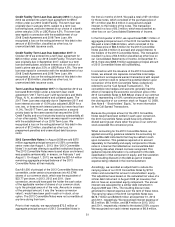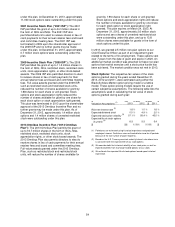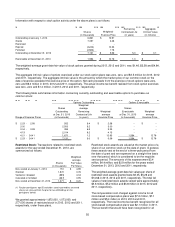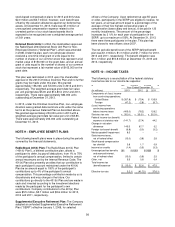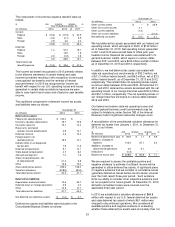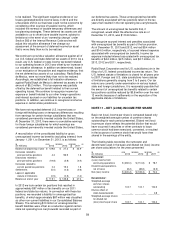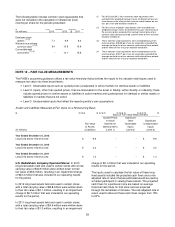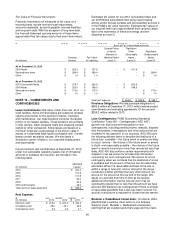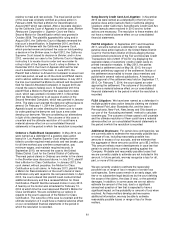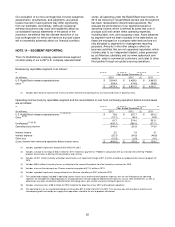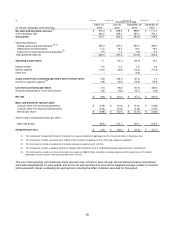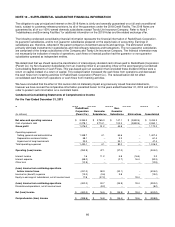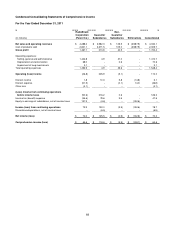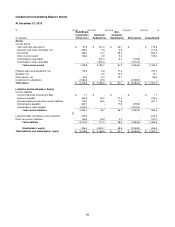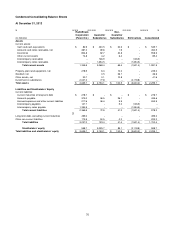Radio Shack 2013 Annual Report Download - page 63
Download and view the complete annual report
Please find page 63 of the 2013 Radio Shack annual report below. You can navigate through the pages in the report by either clicking on the pages listed below, or by using the keyword search tool below to find specific information within the annual report.
61
relating to meal and rest periods. The meal period portion
of the case was originally certified as a class action in
February 2006. We filed a Motion for Decertification in
August 2007 which was denied. After a favorable decision
by the California Court of Appeals in a similar case, Brinker
Restaurant Corporation v. Superior Court, we filed a
Second Motion for Decertification which was granted in
October 2008. The plaintiffs appealed this ruling and in
August 2010, the California Court of Appeals reversed the
trial court’s decertification. In September 2010, we filed a
Petition for Review with the California Supreme Court,
which granted review and placed the case on hold pending
a decision in the Brinker case. In April 2012, the California
Supreme Court issued its decision in Brinker, and in June
2012, remanded our case to the California Court of Appeals
instructing it to vacate its prior order and reconsider its
ruling in light of the Supreme Court’s ruling in Brinker. In
December 2012, the Court of Appeals affirmed the trial
court’s decertification of the class. In June 2013, the
Plaintiff filed a Motion to Amend his Complaint to assert rest
and meal period, as well as off-the-clock and PAGA claims,
and to add an additional class representative. In July 2013
the trial court granted the Motion to Amend and the plaintiff
filed his Second Amended Complaint. In August 2013 we
moved the case to federal court. In September 2013 the
plaintiff filed a Motion to Remand the case back to state
court, which was granted in October 2013. In November
2013 we filed a demurrer to all causes of action in the
Second Amended Complaint, which was granted in January
2014. The state court granted the demurrer without leave to
amend. On February 11, 2014 the California Court of
Appeals issued an order directing the lower court to vacate
its order granting the demurrer and issue a new order
denying our demurrer. We are considering our alternatives
in light of this development. The outcome of this case is
uncertain and the ultimate resolution of it could have a
material adverse effect on our consolidated financial
statements in the period in which the resolution is recorded.
Ordonez v. RadioShack Corporation: In May 2010, we
were named as a defendant in a putative class action
lawsuit in Los Angeles Superior Court alleging that we
failed to provide required meal periods and rest breaks, pay
for all time worked, pay overtime compensation, pay
minimum wages, and maintain required records. In
September 2010, we removed the case to the United
States District Court for the Central District of California.
The meal period claims in Ordonez are similar to the claims
in the Brookler case discussed above. In July 2012, plaintiff
filed a Motion for Class Certification. In January 2013, the
court denied, without prejudice, the Motion for Class
Certification as to all claims. In February 2013, plaintiff filed
a Motion for Reconsideration of the court’s denial of class
certification only with regard to the rest period claim. In April
2013, the court ordered that plaintiff could conduct limited
additional discovery and file a renewed Motion for Class
Certification. Plaintiff filed the renewed motion in July 2013.
A hearing on the motion was scheduled for February 10,
2014 at which time the court approved Plaintiff’s Motion for
Class Certification. We are considering our options in
regards to the court’s approval of the Motion for Class
Certification. The outcome of this case is uncertain and the
ultimate resolution of it could have a material adverse effect
on our consolidated financial statements in the period in
which the resolution is recorded.
Song-Beverly Credit Card Act Litigation: In November
2010 we were named as a defendant in the first of four
putative class action lawsuits filed in California alleging
violations under California’s Song-Beverly Credit Card Act.
These lawsuits were resolved in 2013 and no further
actions are necessary. The resolution to these matters did
not have a material adverse effect on our consolidated
financial statements.
FACTA Litigation: In September 2011 and November
2011, we were named as a defendant in nationwide
putative class action lawsuits in the United States District
Court for the Northern District of Illinois alleging that we
violated certain provisions of the Fair and Accurate Credit
Transactions Act of 2003 (“FACTA”) by displaying the
expiration dates of customers’ credit or debit cards on
printed transaction receipts. In May 2013, the parties
reached a settlement and on May 29, 2013, the court
granted preliminary approval of the settlement. Notice of
the settlement was mailed to known class members and
published in several national publications. A hearing on
final approval of the settlement was held on September 17,
2013. On February 7, 2014, the court signed an order
approving the settlement. The outcome of this matter did
not have a material adverse effect on our consolidated
financial statements in the period in which the resolution is
recorded.
FLSA Litigation: We have been named as a defendant in
multiple putative class action lawsuits claiming we violated
the federal Fair Labor Standards Act, and the laws of
Pennsylvania, New York, New Jersey and Ohio based on
our use of the “fluctuating workweek” method to calculate
overtime pay. The outcome of these cases is still uncertain
and the ultimate resolution of them could have a material
adverse effect on our consolidated financial statements in
the period in which the resolution is recorded.
Additional Disclosure: For certain loss contingencies, we
are currently able to estimate the reasonably possible loss
or range of loss, including reasonably possible loss
amounts in excess of our accruals, and we estimate that
the aggregate of these amounts could be up to $5.2 million.
This amount reflects recent developments in case law that
pertain to certain claims currently pending against the
Company. Probable and reasonably possible losses that
we are currently unable to estimate are not included in this
amount. In future periods, we may recognize a loss for all,
part, or none of this amount.
We are currently unable to estimate the reasonably
possible loss or range of loss in respect of certain loss
contingencies. Some cases remain in an early stage, with
few or no substantive legal decisions by the court defining
the scope of the claims, the class (if any), or the potential
damages. In addition, in some cases we are not able to
estimate the amount of the loss, due to a significant
unresolved question of law that is expected to have a
significant impact on the probability or amount of loss when
resolved. As these matters develop and we receive
additional information, we may be able to estimate
reasonably possible losses or range of loss for these
matters.


